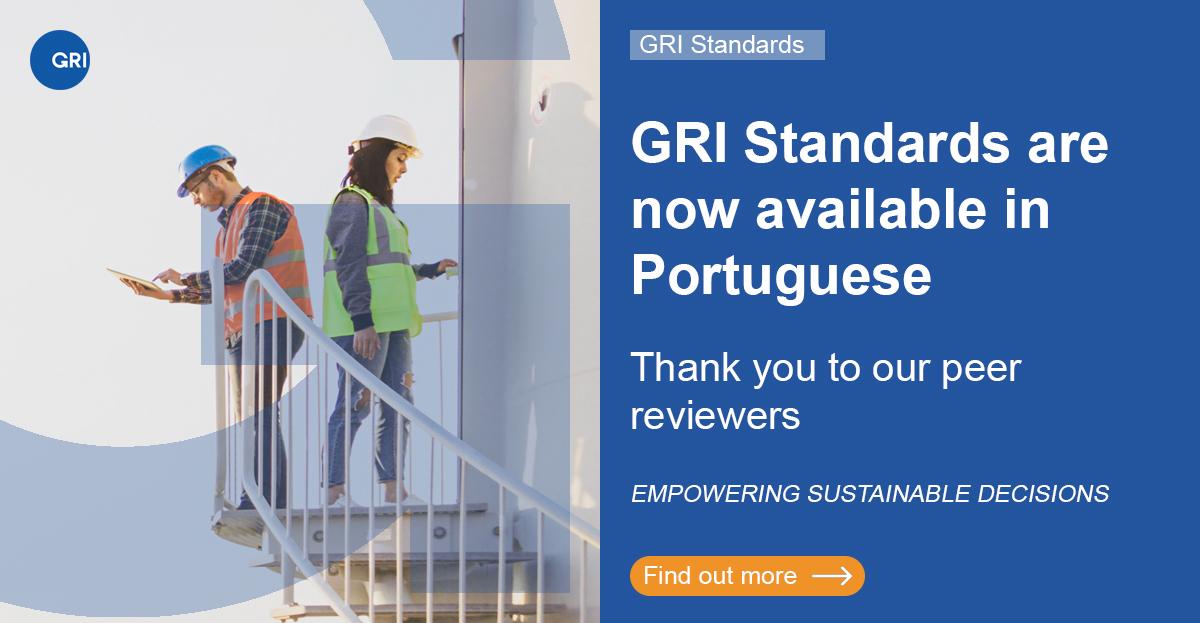GRI Standards Available in Portuguese
Increased global accessibility with Standards now in 12 languages

Organizations in Brazil, Portugal and eight other countries have improved access to the world’s most widely used standards for sustainability reporting, following publication of the GRI Standards in Portuguese.
The Portuguese translation enables GRI to further expand its reach with organizations and stakeholders in Portuguese speaking countries. GRI currently has more than 6,000 registered users in Brazil and Portugal.
This means that the full suite of GRI Standards – covering three universal and 34 topic-specific Standards – are available in 12 languages: Arabic, Simplified and Traditional Chinese, English, French, German, Indonesian, Italian, Japanese, Portuguese, Spanish, and Vietnamese.
Bastian Buck, GRI Chief of Standards, said:
“The GRI Standards enable organizations to disclose their economic, environmental and social impacts, in a comprehensive, consistent and comparable way. It is central, therefore, to our mission that we ensure the Standards are relevant and easily accessible for organizations – irrespective of their size, sector or location.
The addition of Portuguese, the sixth most widely spoken global language, is a significant step. We look forward to deepening our engagement with Portuguese speaking companies, supporting them to take responsibility for their impacts and improve their sustainability performance.”
Glaucia Terreo, Director of GRI Brazil, said:
“GRI has a long-standing relationship with Brazil where we established our regional hub in 2007. We work closely with organizations and other stakeholders to strengthen corporate transparency and increase both the uptake and quality of sustainability reporting in the country.
Providing all GRI Standards in Portuguese is a game changer for us, offering new opportunities to reach more organizations. Brazil is South America’s biggest economy, and the world’s ninth largest by GDP, which demonstrates its sustainability potential. That’s why we are fully committed to doing all we can support responsible business practices by Brazilian companies.”
The Portuguese translations of the GRI Standards are available for download.
The translation was carried out by Beto Bezerril and Martha Villac and peer reviewed by:
- João Pedro Dias Fischer, Production Engineer, Lojas Renner S.A.
- Cássio Luiz Vellani, Professor, Federal Institute of Education, Science and Technology of São Paulo
- Mariana Nunes Páscoa, Environmental Engineer, Transtejo-Soflusa
- Amanda de Andrade, Partner, Andrade Consultores
- Roberto Bedrikow, Founder and CEO, GEthics
- Sonia Margarida Csordas, Geographer and Coordinator of Environmental Studies
- Lindermara de Oliveira, Communication and Marketing Specialist, Sinctronics
Since 2016, over 6,000 users from Portuguese-speaking countries (5,000 from Brazil and 1,300 from Portugal) have registered to download the GRI Standards.
Global Reporting Initiative (GRI) is the independent, international organization that helps businesses and other organizations take responsibility for their impacts, by providing them with the global common language to report those impacts. Learn more about GRI in Brazil.
The GRI Standards are the world’s most widely used and comprehensive sustainability reporting standards, which are developed through a multi-stakeholder process and made available as a free public good.
Brazil’s GDP ranking as ninth globally is based on World Bank data (2020). Analysis by Ethnologue (2019) places Portuguese as the sixth most spoken language, with 221 million native speakers. Portuguese is an official language in 10 countries.

